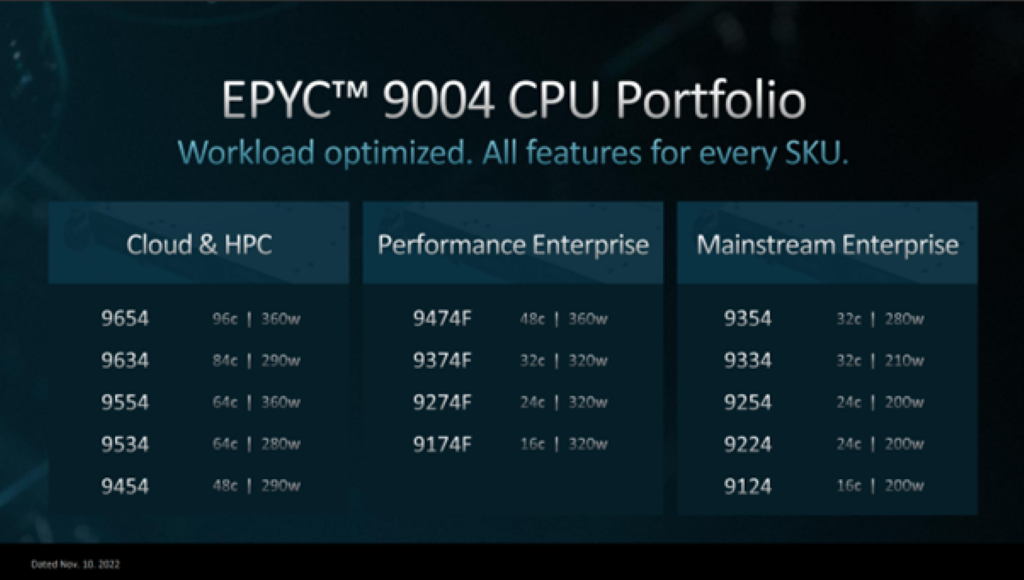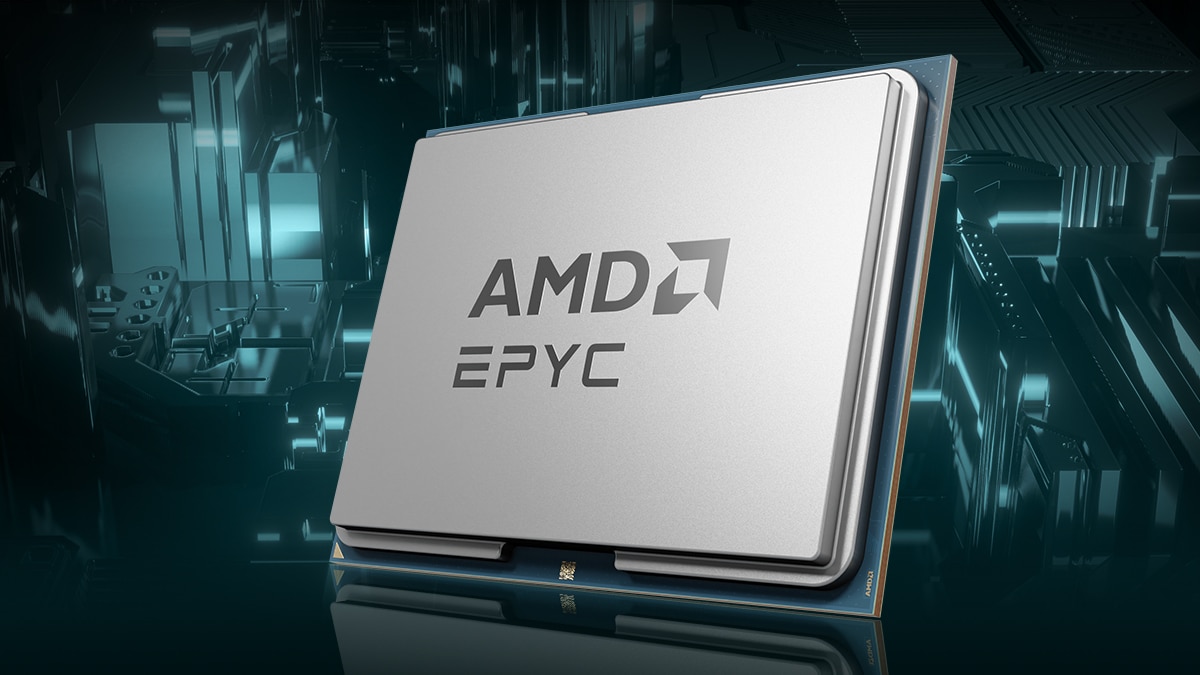AMD EPYC™ 9004 Series Processors
Say hello to the world’s highest performing server CPU.1
4th Gen AMD EPYC™ processors transform what you know about data center processor capabilities, delivering outstanding performance, energy efficiency, and leadership TCO across workloads.
4th Gen AMD EPYC™ the World’s Highest Performing CPU1
4th Gen AMD EPYC processors are on the cutting edge of server processor technology, with up to 96 “Zen 4” cores based on a 5nm process, the strongest server product cores AMD has ever produced.2 Supporting those cores is 1MB per core of L2 Cache, and 32MB per CCD of L3 cache, along with 12 DDR5 channels supporting up to 12TB of memory, CXL™ memory expansion, and PCIe® 5.0 support, offering up to 128 lanes of high bandwidth for the latest graphics and storage technologies.
It’s this rise in both performance and technology that’s enabled the AMD EPYC™ family of processors to achieve more than 300 world records and counting across data management, infrastructure, business applications, and HPC workloads.3
Compared to last generation AMD EPYC processors and competitor products, 4th Gen AMD EPYC™ 9654 processor powered servers deliver up to 3x the cloud performance leadership, 2.5x the HPC performance leadership, and 2.9x the enterprise performance leadership.4,5,6
Performance Without the Energy Price Tag
4th Gen AMD EPYC processors not only deliver outstanding leadership performance across almost every metric when it comes to server processing, they perform those tasks while improving power efficiency measurably over previous generation and competitor products.
In fact, 4th Gen AMD EPYC processors power the most energy efficient x86 servers.
When it comes to performance-per-watt improvements across integer performance, floating point, and NLP throughput, these new 64-core AMD EPYC™ 9534 processors offer up to 2.7x greater results than those of previous generation AMD EPYC products with similar core counts.7
That all culminates in a server processor that prioritizes lower power usage, lower energy costs, and more performance output per server, all essential generational improvements for customers deploying server infrastructure at scale.
AMD EPYC™ Processor Security: Helping Protect Your Data
One of the core pillars of a successful server solution is sufficient security. Those new to the AMD EPYC™ processor platform will appreciate the strong ecosystem of security features AMD has built from the ground up.
AMD Infinity Guard comprises multiple layers of security features, from silicon-level security features with AMD Secure Processor, through to modern container security features and secure memory encryption systems that help protect data before the system is even turned on.8
Building on the state-of-the-art AMD Infinity Guard security feature set, 4th Gen AMD EPYC processors add improved advanced features such as 256-bit AES-XTS encryption and secure multi-key encryption (SMKE) that enables hypervisors to selectively encrypt address space ranges on CXL™ attached memory. This makes the existing software encryption features work seamlessly with CXL-attached memory. This leverages a growing ecosystem of confidential computing that focuses on addressing the special security concerns about migrating sensitive applications and data by encrypting data in-use, in cloud and virtualization environments. Learn more about AMD Infinity Guard, and the technologies used to help protect customer processes and data.
Ultimately, 4th Gen AMD EPYC processors deliver a powerful, efficient, secure environment for a range of workloads in the data center, that out-performs both AMD and competitor products available today and helps reduce operating costs while doing so.
For a brighter future of performance computing, provide 4th Gen AMD EPYC processors to your customers for their next installation. You can find 4th Gen AMD EPYC processors on-shelf now, and available from your local AMD distributor.

AMD Arena
Enhance your AMD product knowledge with training on AMD Ryzen™ PRO, AMD EPYC™, AMD Instinct™, and more.
Subscribe
Get monthly updates on AMD’s latest products, training resources, and Meet the Experts webinars.

Related Articles
Related Training Courses
Related Webinars
Footnotes
- 96-core EPYC 9654 CPU processors results as of 11/10/2022 using SPECrate®2017_int_base. The AMD EPYC scored 1790 SPECrate®2017_int_base which is higher than all other 2P scores published on the SPEC® website. 2P AMD EPYC 9654 (1790 SPECrate®2017_int_base, 192 total cores, www.spec.org/cpu2017/results/res2022q4/cpu2017-20221024-32607.html). SPEC®, SPECrate® and SPEC CPU® are registered trademarks of the Standard Performance Evaluation Corporation. See www.spec.org for more information. SP5-013A
- AMD EPYC 9004 Series delivers up to a ~14% geomean IPC single thread uplift generationally based on AMD internal testing as of 09/19/2022, performance improvement at the same fixed-frequency on a 4th Gen AMD EPYC™ 9554 CPU compared to a 3rd Gen AMD EPYC™ 7763 CPU using a select set of workloads (33) including est. SPECrate®2017_int_base, est. SPECrate®2017_fp_base, and representative server workloads. EPYC-038
- EPYC-022B: For a complete list of world records see http://amd.com/worldrecords.4 SPECrate®2017_fp_base based on published scores from www.spec.org as of 11/10/2022. Configurations: 2P AMD EPYC 9654 (1480 SPECrate®2017_fp_base, 192 total cores, www.spec.org/cpu2017/results/res2022q4/cpu2017-20221024-32605.html) is 2.52x the performance of published 2P Intel Xeon Platinum 8380 (587 SPECrate®2017_fp_base, 160 total cores, www.spec.org/cpu2017/results/res2022q4/cpu2017-20221010-32542.html).Published 2P AMD EPYC 7763 (663 SPECrate®2017_fp_base, 128 Total Cores, http://spec.org/cpu2017/results/res2021q4/cpu2017- 20211121-30146.html) is shown at 1.13x for reference. SPEC®, SPEC CPU®, and SPECrate® are registered trademarks of the Standard Performance Evaluation Corporation. See www.spec.org for more in
- SPECjbb® 2015-MultiJVM Max based on published scores from www.spec.org as of 11/10/2022. Configurations: 2P AMD EPYC 9654 (815459 SPECjbb®2015 MultiJVM max-jOPS, 356204 SPECjbb®2015 MultiJVM critical-jOPS, 192 Total Cores, http://www.spec.org/jbb2015/results/res2022q4/jbb2015-20221019-00861.html) is 2.85x the performance of published 2P Intel Xeon Platinum 8380 (286125 SPECjbb®2015 MultiJVM max-jOPS, 152057 SPECjbb®2015 MultiJVM critical-jOPS, 80 Total Cores, http://www.spec.org/jbb2015/results/res2021q4/jbb2015-20211006-00706.html). 2P AMD EPYC 7763 (420774 SPECjbb®2015 MultiJVM max-jOPS, 165211 SPECjbb®2015 MultiJVM critical-jOPS, 128 total cores, http://www.spec.org/jbb2015/results/res2021q3/jbb2015-20210701-00692.html) shown at 1.47x for reference. SPEC® and SPECjbb® are registered trademarks of the Standard Performance Evaluation Corporation. See www.spec.org for more information. SP5-012B
- SP5-010B: SPECrate®2017_int_base based on published scores from www.spec.org as of 11/10/2022. Configurations: 2P AMD EPYC 9654 (1790 SPECrate®2017_int_base, 192 total cores, www.spec.org/cpu2017/results/res2022q4/cpu2017-20221024-32607.html) is 2.97x the performance of published 2P Intel Xeon Platinum 8380 (602 SPECrate®2017_int_base, 80 total cores, http://spec.org/cpu2017/results/res2021q2/cpu2017-20210521-26364.html). Published 2P AMD EPYC 7763 (861 SPECrate®2017_int_base, 128 total cores, http://spec.org/cpu2017/results/res2021q4/cpu2017-20211121-30148.html) is shown at 1.43x for reference. SPEC®, SPEC CPU®, and SPECrate® are registered trademarks of the Standard Performance Evaluation Corporation. See www.spec.org for more information. NOTE: Red text only needs to be included with charts that show the 7763.
- SP5-072: A 4th Gen EPYC 9654 powered server has highest overall scores in key industry-recognized energy efficiency benchmarks SPECpower_ssj®2008, SPECrate®2017_int_energy_base and SPECrate®2017_fp_energy_base. EPYCWR-392: 2P AMD EPYC 9654 (1950 SPECrate®2017_fp_energy_base/899 SPECrate®2017_fp_base, 192 total cores, www.spec.org/cpu2017/results/res2022q4/cpu2017-20221024-32630.html) has the best overall SPECrate®2017_fp_energy_base score on www.spec.org as of 11/10/2022. EPYCWR-394: 2P AMD EPYC 9654 (1950 SPECrate®2017_fp_energy_base/899 SPECrate®2017_fp_base, 192 total cores, www.spec.org/cpu2017/results/res2022q4/cpu2017-20221024-32630.html) has the best 2P SPECrate®2017_fp_energy_base score on www.spec.org as of 11/10/2022. EPYCWR-395: 2P AMD EPYC 9654 (2010 SPECrate®2017_fp_energy_peak/1900 SPECrate®2017_fp_energy_base/1000 SPECrate®2017_fp_peak/954 SPECrate®2017_fp_base, 192 total cores, www.spec.org/cpu2017/results/res2022q4/cpu2017-20221024-32634.html) has the best overall SPECrate®2017_fp_energy_peak score on www.spec.org as of 11/10/2022. EPYCWR-397: 2P AMD EPYC 9654 (2010 SPECrate®2017_fp_energy_peak/1900 SPECrate®2017_fp_energy_base/1000 SPECrate®2017_fp_peak/954 SPECrate®2017_fp_base, 192 total cores, www.spec.org/cpu2017/results/res2022q4/cpu2017-20221024-32634.html) has the best 2P SPECrate®2017_fp_energy_peak score on www.spec.org as of 11/10/2022. EPYCWR-407: 2P AMD EPYC 9654 (1890 SPECrate®2017_int_energy_base/1190 SPECrate®2017_int_base, 192 total cores, www.spec.org/cpu2017/results/res2022q4/cpu2017-20221024-32633.html) has the best overall SPECrate®2017_int_energy_base score on www.spec.org as of 11/10/2022.EPYCWR-409: 2P AMD EPYC 9654 (1890 SPECrate®2017_int_energy_base/1190 SPECrate®2017_int_base, 192 total cores, www.spec.org/cpu2017/results/res2022q4/cpu2017-20221024-32633.html) has the best 2P score on www.spec.org as of 11/10/2022.EPYCWR-410: 2P AMD EPYC 9654 (1990 SPECrate®2017_int_energy_peak/1890 SPECrate®2017_int_energy_base/1280 SPECrate®2017_int_peak/1190 SPECrate®2017_int_base, 192 total cores, www.spec.org/cpu2017/results/res2022q4/cpu2017-20221024-32633.html) has the best overall SPECrate®2017_int_energy_peak score on www.spec.org as of 11/10/2022.EPYCWR-412: 2P AMD EPYC 9654 (1990 SPECrate®2017_int_energy_peak/1890 SPECrate®2017_int_energy_base/1280 SPECrate®2017_int_peak/1190 SPECrate®2017_int_base, 192 total cores, www.spec.org/cpu2017/results/res2022q4/cpu2017-20221024-32633.html) has the best 2P SPECrate®2017_int_energy_peak score on www.spec.org as of 11/10/2022.EPYCWR-420: 2P AMD EPYC 9654 (688 SPECspeed®2017_fp_energy_base/317 SPECspeed®2017_fp_base, 192 total cores, www.spec.org/cpu2017/results/res2022q4/cpu2017-20221024-32632.html) has the best 2P SPECspeed®2017_fp_energy_base score on www.spec.org as of 11/10/2022.EPYCWR-423: 2P AMD EPYC 9654 (718 SPECspeed®2017_fp_energy_peak/681 SPECspeed®2017_fp_energy_base/337 SPECspeed®2017_fp_peak/317 SPECspeed®2017_fp_base, 192 total cores, www.spec.org/cpu2017/results/res2022q4/cpu2017-20221024-32631.html) has the best 2P SPECspeed®2017_fp_energy_peak score on www.spec.org as of 11/10/2022.EPYCWR-509: 2P AMD EPYC 9654 (27501 overall ssj_ops/W, 2U, http://www.spec.org/power_ssj2008/results/res2022q4/power_ssj2008-20221020-01194.html) has the best overall ssj_ops/W score on www.spec.org as of 11/10/2022.EPYCWR-510: 2P AMD EPYC 9654 (25333 overall ssj_ops/W, 1U, http://www.spec.org/power_ssj2008/results/res2022q4/power_ssj2008-20221020-01186.html) has the best 1U ssj_ops/W score on www.spec.org as of 11/10/2022.EPYCWR-511: 2P AMD EPYC 9654 (27501 overall ssj_ops/W, 2U, http://www.spec.org/power_ssj2008/results/res2022q4/power_ssj2008-20221020-01194.html) has the best 2U ssj_ops/W score on www.spec.org as of 11/10/2022. EPYCWR-514: 1P AMD EPYC 9654P (23299 overall ssj_ops/W, 1U, http://www.spec.org/power_ssj2008/results/res2022q4/power_ssj2008-20221020-01188.html) has the best 1 CPU 1U Linux ssj_ops/W score on www.spec.org as of 11/10/2022. EPYCWR-515: 1P AMD EPYC 9654P (25537 overall ssj_ops/W, 2U, http://www.spec.org/power_ssj2008/results/res2022q4/power_ssj2008-20221020-01187.html) has the best 1 CPU 2U Linux ssj_ops/W score on www.spec.org as of 11/10/2022. EPYCWR-517: 1P AMD EPYC 9654P (22178 overall ssj_ops/W, 2U, http://www.spec.org/power_ssj2008/results/res2022q4/power_ssj2008-20221020-01191.html) has the best 1 CPU 2U Windows ssj_ops/W score on www.spec.org as of 11/10/2022. EPYCWR-520: 2P AMD EPYC 9654 (25333 overall ssj_ops/W, 1U, http://www.spec.org/power_ssj2008/results/res2022q4/power_ssj2008-20221020-01186.html) has the best 2 CPU 1U Linux l ssj_ops/W score on www.spec.org as of 11/10/2022. EPYCWR-521: 2P AMD EPYC 9654 (27118 overall ssj_ops/W, 2U, http://www.spec.org/power_ssj2008/results/res2022q4/power_ssj2008-20221020-01193.html) has the best 2 CPU 2U Linux ssj_ops/W score on www.spec.org as of 11/10/2022. EPYCWR-523: 2P AMD EPYC 9654 (27501 overall ssj_ops/W, 2U, http://www.spec.org/power_ssj2008/results/res2022q4/power_ssj2008-20221020-01194.html) has the best 2 CPU 2U Windows ss jops/W score on www.spec.org as of 11/10/2022.
- SPECrate®2017_int_base, SPECrate®2017_fp_base, and BERT-large estimates based on internal AMD reference platform measurements of 11/3/2022. Floating-point throughput comparison: 2P AMD EPYC 9534 (1030 est. SPECrate®2017_fp_base, 560 Total TDP W, 128 Total Cores) is 1.66x the performance/W of published 2P AMD EPYC 7763 (622 est. SPECrate®2017_fp_base, 560 Total TDP W, 128 Total Cores). Integer throughput comparison: 2P AMD EPYC 9534 (1070 est. SPECrate®2017_int_base, 560 Total TDP W, 128 Total Cores) is 1.34x the performance/W of published 2P AMD EPYC 7763 (800 est. SPECrate®2017_int_base, 560 Total TDP W, 128 Total Cores). Bert-Large NLP sparse INT8 comparison: 2P AMD EPYC 9534 (345.6 items/sec, 560 Total TDP W, 128 Total Cores) is 2.67x the performance/W of published 2P AMD EPYC 7763 (129.7 items/sec, 560 Total TDP W, 128 Total Cores). SPEC®, SPEC CPU®, and SPECrate® are registered trademarks of the Standard Performance Evaluation Corporation. See www.spec.org for more information. OEM published scores will vary based on system configuration and determinism mode used (default cTDP performance profile). SP5-068
- AMD Infinity Guard features vary by EPYC™ Processor generations. Infinity Guard security features must be enabled by server OEMs and/or Cloud Service Providers to operate. Check with your OEM or provider to confirm support of these features. Learn more about Infinity Guard at https://www.amd.com/en/products/processors/server/epyc/infinity-guard.html. GD-183
- 96-core EPYC 9654 CPU processors results as of 11/10/2022 using SPECrate®2017_int_base. The AMD EPYC scored 1790 SPECrate®2017_int_base which is higher than all other 2P scores published on the SPEC® website. 2P AMD EPYC 9654 (1790 SPECrate®2017_int_base, 192 total cores, www.spec.org/cpu2017/results/res2022q4/cpu2017-20221024-32607.html). SPEC®, SPECrate® and SPEC CPU® are registered trademarks of the Standard Performance Evaluation Corporation. See www.spec.org for more information. SP5-013A
- AMD EPYC 9004 Series delivers up to a ~14% geomean IPC single thread uplift generationally based on AMD internal testing as of 09/19/2022, performance improvement at the same fixed-frequency on a 4th Gen AMD EPYC™ 9554 CPU compared to a 3rd Gen AMD EPYC™ 7763 CPU using a select set of workloads (33) including est. SPECrate®2017_int_base, est. SPECrate®2017_fp_base, and representative server workloads. EPYC-038
- EPYC-022B: For a complete list of world records see http://amd.com/worldrecords.4 SPECrate®2017_fp_base based on published scores from www.spec.org as of 11/10/2022. Configurations: 2P AMD EPYC 9654 (1480 SPECrate®2017_fp_base, 192 total cores, www.spec.org/cpu2017/results/res2022q4/cpu2017-20221024-32605.html) is 2.52x the performance of published 2P Intel Xeon Platinum 8380 (587 SPECrate®2017_fp_base, 160 total cores, www.spec.org/cpu2017/results/res2022q4/cpu2017-20221010-32542.html).Published 2P AMD EPYC 7763 (663 SPECrate®2017_fp_base, 128 Total Cores, http://spec.org/cpu2017/results/res2021q4/cpu2017- 20211121-30146.html) is shown at 1.13x for reference. SPEC®, SPEC CPU®, and SPECrate® are registered trademarks of the Standard Performance Evaluation Corporation. See www.spec.org for more in
- SPECjbb® 2015-MultiJVM Max based on published scores from www.spec.org as of 11/10/2022. Configurations: 2P AMD EPYC 9654 (815459 SPECjbb®2015 MultiJVM max-jOPS, 356204 SPECjbb®2015 MultiJVM critical-jOPS, 192 Total Cores, http://www.spec.org/jbb2015/results/res2022q4/jbb2015-20221019-00861.html) is 2.85x the performance of published 2P Intel Xeon Platinum 8380 (286125 SPECjbb®2015 MultiJVM max-jOPS, 152057 SPECjbb®2015 MultiJVM critical-jOPS, 80 Total Cores, http://www.spec.org/jbb2015/results/res2021q4/jbb2015-20211006-00706.html). 2P AMD EPYC 7763 (420774 SPECjbb®2015 MultiJVM max-jOPS, 165211 SPECjbb®2015 MultiJVM critical-jOPS, 128 total cores, http://www.spec.org/jbb2015/results/res2021q3/jbb2015-20210701-00692.html) shown at 1.47x for reference. SPEC® and SPECjbb® are registered trademarks of the Standard Performance Evaluation Corporation. See www.spec.org for more information. SP5-012B
- SP5-010B: SPECrate®2017_int_base based on published scores from www.spec.org as of 11/10/2022. Configurations: 2P AMD EPYC 9654 (1790 SPECrate®2017_int_base, 192 total cores, www.spec.org/cpu2017/results/res2022q4/cpu2017-20221024-32607.html) is 2.97x the performance of published 2P Intel Xeon Platinum 8380 (602 SPECrate®2017_int_base, 80 total cores, http://spec.org/cpu2017/results/res2021q2/cpu2017-20210521-26364.html). Published 2P AMD EPYC 7763 (861 SPECrate®2017_int_base, 128 total cores, http://spec.org/cpu2017/results/res2021q4/cpu2017-20211121-30148.html) is shown at 1.43x for reference. SPEC®, SPEC CPU®, and SPECrate® are registered trademarks of the Standard Performance Evaluation Corporation. See www.spec.org for more information. NOTE: Red text only needs to be included with charts that show the 7763.
- SP5-072: A 4th Gen EPYC 9654 powered server has highest overall scores in key industry-recognized energy efficiency benchmarks SPECpower_ssj®2008, SPECrate®2017_int_energy_base and SPECrate®2017_fp_energy_base. EPYCWR-392: 2P AMD EPYC 9654 (1950 SPECrate®2017_fp_energy_base/899 SPECrate®2017_fp_base, 192 total cores, www.spec.org/cpu2017/results/res2022q4/cpu2017-20221024-32630.html) has the best overall SPECrate®2017_fp_energy_base score on www.spec.org as of 11/10/2022. EPYCWR-394: 2P AMD EPYC 9654 (1950 SPECrate®2017_fp_energy_base/899 SPECrate®2017_fp_base, 192 total cores, www.spec.org/cpu2017/results/res2022q4/cpu2017-20221024-32630.html) has the best 2P SPECrate®2017_fp_energy_base score on www.spec.org as of 11/10/2022. EPYCWR-395: 2P AMD EPYC 9654 (2010 SPECrate®2017_fp_energy_peak/1900 SPECrate®2017_fp_energy_base/1000 SPECrate®2017_fp_peak/954 SPECrate®2017_fp_base, 192 total cores, www.spec.org/cpu2017/results/res2022q4/cpu2017-20221024-32634.html) has the best overall SPECrate®2017_fp_energy_peak score on www.spec.org as of 11/10/2022. EPYCWR-397: 2P AMD EPYC 9654 (2010 SPECrate®2017_fp_energy_peak/1900 SPECrate®2017_fp_energy_base/1000 SPECrate®2017_fp_peak/954 SPECrate®2017_fp_base, 192 total cores, www.spec.org/cpu2017/results/res2022q4/cpu2017-20221024-32634.html) has the best 2P SPECrate®2017_fp_energy_peak score on www.spec.org as of 11/10/2022. EPYCWR-407: 2P AMD EPYC 9654 (1890 SPECrate®2017_int_energy_base/1190 SPECrate®2017_int_base, 192 total cores, www.spec.org/cpu2017/results/res2022q4/cpu2017-20221024-32633.html) has the best overall SPECrate®2017_int_energy_base score on www.spec.org as of 11/10/2022.EPYCWR-409: 2P AMD EPYC 9654 (1890 SPECrate®2017_int_energy_base/1190 SPECrate®2017_int_base, 192 total cores, www.spec.org/cpu2017/results/res2022q4/cpu2017-20221024-32633.html) has the best 2P score on www.spec.org as of 11/10/2022.EPYCWR-410: 2P AMD EPYC 9654 (1990 SPECrate®2017_int_energy_peak/1890 SPECrate®2017_int_energy_base/1280 SPECrate®2017_int_peak/1190 SPECrate®2017_int_base, 192 total cores, www.spec.org/cpu2017/results/res2022q4/cpu2017-20221024-32633.html) has the best overall SPECrate®2017_int_energy_peak score on www.spec.org as of 11/10/2022.EPYCWR-412: 2P AMD EPYC 9654 (1990 SPECrate®2017_int_energy_peak/1890 SPECrate®2017_int_energy_base/1280 SPECrate®2017_int_peak/1190 SPECrate®2017_int_base, 192 total cores, www.spec.org/cpu2017/results/res2022q4/cpu2017-20221024-32633.html) has the best 2P SPECrate®2017_int_energy_peak score on www.spec.org as of 11/10/2022.EPYCWR-420: 2P AMD EPYC 9654 (688 SPECspeed®2017_fp_energy_base/317 SPECspeed®2017_fp_base, 192 total cores, www.spec.org/cpu2017/results/res2022q4/cpu2017-20221024-32632.html) has the best 2P SPECspeed®2017_fp_energy_base score on www.spec.org as of 11/10/2022.EPYCWR-423: 2P AMD EPYC 9654 (718 SPECspeed®2017_fp_energy_peak/681 SPECspeed®2017_fp_energy_base/337 SPECspeed®2017_fp_peak/317 SPECspeed®2017_fp_base, 192 total cores, www.spec.org/cpu2017/results/res2022q4/cpu2017-20221024-32631.html) has the best 2P SPECspeed®2017_fp_energy_peak score on www.spec.org as of 11/10/2022.EPYCWR-509: 2P AMD EPYC 9654 (27501 overall ssj_ops/W, 2U, http://www.spec.org/power_ssj2008/results/res2022q4/power_ssj2008-20221020-01194.html) has the best overall ssj_ops/W score on www.spec.org as of 11/10/2022.EPYCWR-510: 2P AMD EPYC 9654 (25333 overall ssj_ops/W, 1U, http://www.spec.org/power_ssj2008/results/res2022q4/power_ssj2008-20221020-01186.html) has the best 1U ssj_ops/W score on www.spec.org as of 11/10/2022.EPYCWR-511: 2P AMD EPYC 9654 (27501 overall ssj_ops/W, 2U, http://www.spec.org/power_ssj2008/results/res2022q4/power_ssj2008-20221020-01194.html) has the best 2U ssj_ops/W score on www.spec.org as of 11/10/2022. EPYCWR-514: 1P AMD EPYC 9654P (23299 overall ssj_ops/W, 1U, http://www.spec.org/power_ssj2008/results/res2022q4/power_ssj2008-20221020-01188.html) has the best 1 CPU 1U Linux ssj_ops/W score on www.spec.org as of 11/10/2022. EPYCWR-515: 1P AMD EPYC 9654P (25537 overall ssj_ops/W, 2U, http://www.spec.org/power_ssj2008/results/res2022q4/power_ssj2008-20221020-01187.html) has the best 1 CPU 2U Linux ssj_ops/W score on www.spec.org as of 11/10/2022. EPYCWR-517: 1P AMD EPYC 9654P (22178 overall ssj_ops/W, 2U, http://www.spec.org/power_ssj2008/results/res2022q4/power_ssj2008-20221020-01191.html) has the best 1 CPU 2U Windows ssj_ops/W score on www.spec.org as of 11/10/2022. EPYCWR-520: 2P AMD EPYC 9654 (25333 overall ssj_ops/W, 1U, http://www.spec.org/power_ssj2008/results/res2022q4/power_ssj2008-20221020-01186.html) has the best 2 CPU 1U Linux l ssj_ops/W score on www.spec.org as of 11/10/2022. EPYCWR-521: 2P AMD EPYC 9654 (27118 overall ssj_ops/W, 2U, http://www.spec.org/power_ssj2008/results/res2022q4/power_ssj2008-20221020-01193.html) has the best 2 CPU 2U Linux ssj_ops/W score on www.spec.org as of 11/10/2022. EPYCWR-523: 2P AMD EPYC 9654 (27501 overall ssj_ops/W, 2U, http://www.spec.org/power_ssj2008/results/res2022q4/power_ssj2008-20221020-01194.html) has the best 2 CPU 2U Windows ss jops/W score on www.spec.org as of 11/10/2022.
- SPECrate®2017_int_base, SPECrate®2017_fp_base, and BERT-large estimates based on internal AMD reference platform measurements of 11/3/2022. Floating-point throughput comparison: 2P AMD EPYC 9534 (1030 est. SPECrate®2017_fp_base, 560 Total TDP W, 128 Total Cores) is 1.66x the performance/W of published 2P AMD EPYC 7763 (622 est. SPECrate®2017_fp_base, 560 Total TDP W, 128 Total Cores). Integer throughput comparison: 2P AMD EPYC 9534 (1070 est. SPECrate®2017_int_base, 560 Total TDP W, 128 Total Cores) is 1.34x the performance/W of published 2P AMD EPYC 7763 (800 est. SPECrate®2017_int_base, 560 Total TDP W, 128 Total Cores). Bert-Large NLP sparse INT8 comparison: 2P AMD EPYC 9534 (345.6 items/sec, 560 Total TDP W, 128 Total Cores) is 2.67x the performance/W of published 2P AMD EPYC 7763 (129.7 items/sec, 560 Total TDP W, 128 Total Cores). SPEC®, SPEC CPU®, and SPECrate® are registered trademarks of the Standard Performance Evaluation Corporation. See www.spec.org for more information. OEM published scores will vary based on system configuration and determinism mode used (default cTDP performance profile). SP5-068
- AMD Infinity Guard features vary by EPYC™ Processor generations. Infinity Guard security features must be enabled by server OEMs and/or Cloud Service Providers to operate. Check with your OEM or provider to confirm support of these features. Learn more about Infinity Guard at https://www.amd.com/en/products/processors/server/epyc/infinity-guard.html. GD-183








